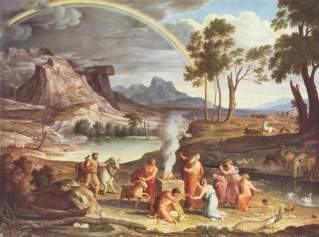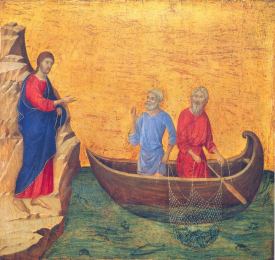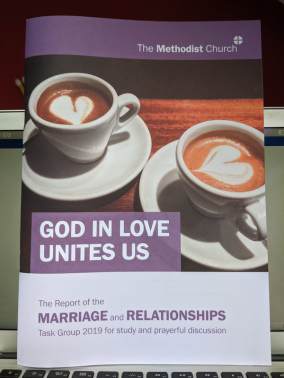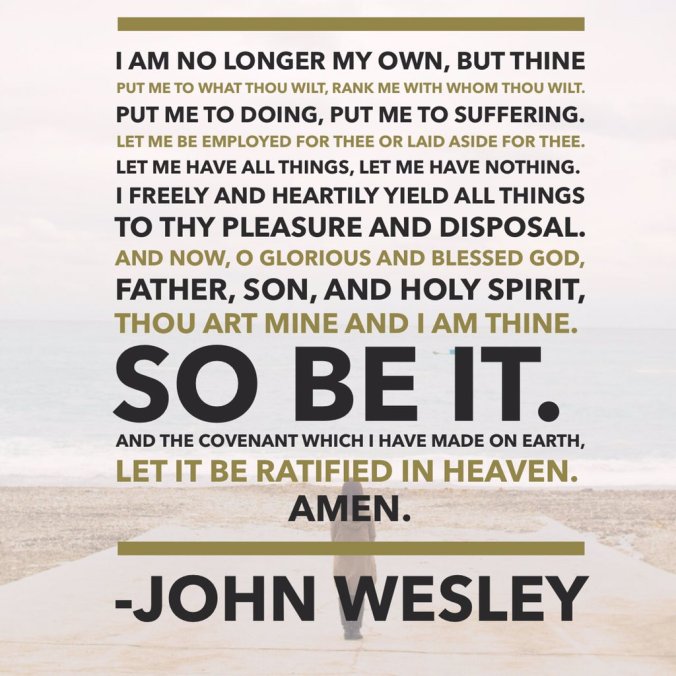 First, may I wish anyone reading this a happy new year, and may I also apologise for the lack of material on this site for the last few months. It has been a challenging time in our circuit of churches and I found myself suddenly thrust into the role of superintendent minister in November, overseeing the work of our group of Methodist churches. As you will read later on, there have also been important, but joyful, developments in my personal life. All of this has meant that sermons have had to be prepared in haste, with a few notes, and no time for blogs. I do hope that I shall be able to do a little better in the future!
First, may I wish anyone reading this a happy new year, and may I also apologise for the lack of material on this site for the last few months. It has been a challenging time in our circuit of churches and I found myself suddenly thrust into the role of superintendent minister in November, overseeing the work of our group of Methodist churches. As you will read later on, there have also been important, but joyful, developments in my personal life. All of this has meant that sermons have had to be prepared in haste, with a few notes, and no time for blogs. I do hope that I shall be able to do a little better in the future!
This is the text of my Covenant sermon, which I have so far preached (in various forms!) at several of my local churches, including Barnes and Putney Methodist Churches. The texts I chose were: Genesis 12:1-5 (the call of Abram) and Matthew 4:18-22 (Jesus calls the first disciples).
We find covenants, of various kinds, scattered throughout our Bible. From the Noahic covenant in the first pages of Genesis (Gen. 9:8–17), made between God and humanity after the great flood had subsided and sealed by the sign of the rainbow in the sky, right through to the new covenant, ushered in by the life, death and resurrection of Jesus and which we celebrate in our communion. These different covenants have much in common, made between two distinctly unequal partners but placing obligations on both God and humanity. I could have selected any number of them to speak about profitably today but have chosen two.
 The first is arguably one of the best-known examples of covenant in the Bible, that made between God and Abram (later Abraham), and is a passage that remains foundational to Jews to this day. Abram is called by God to leave behind all that is familiar and secure, and to travel across the known world with all his clan and possessions. In return, he is promised, God will bless him and his descendants richly.
The first is arguably one of the best-known examples of covenant in the Bible, that made between God and Abram (later Abraham), and is a passage that remains foundational to Jews to this day. Abram is called by God to leave behind all that is familiar and secure, and to travel across the known world with all his clan and possessions. In return, he is promised, God will bless him and his descendants richly.
The second is arguably not a covenant at all, in the more formal Biblical sense, but to me there is a very clear covenantal aspect to what is being described. Like Abram so many years before, Simon Peter and Andrew are called by God, made incarnate in Jesus, to leave behind all the comforts and securities of home, and venture into the unknown. On this occasion, though, there is no mention whatever of material reward, simply the offer that they might become ‘fishers of people’. As the hymn writer expresses it more poetically (‘Jesus calls us o’er the tumult’):
turned from home and toil and kindred,
leaving all for his dear sake
 What both passages have in common, along with nearly all the covenants described in the Bible, is the element of uncertainty. Of stepping out into the unknown; of putting our hand into the hand of God and trusting in God alone for what is to come. It is a frightening and challenging place to find oneself, but it is where all Christians are ultimately called to live.
What both passages have in common, along with nearly all the covenants described in the Bible, is the element of uncertainty. Of stepping out into the unknown; of putting our hand into the hand of God and trusting in God alone for what is to come. It is a frightening and challenging place to find oneself, but it is where all Christians are ultimately called to live.
These passages, speaking as they do of stepping into the unknown, resonate very clearly with the start of the new year, even a new decade. All of us are gazing ahead into the mists of the year, and years, that are to come, and wondering what lies ahead. Like Abram at the start of his incredible trek across the Middle East or the disciples gathered by the shores of the lake, we are forced to pause and ponder the journeys of our own lives, and where we will ultimately end up.
For our individual churches, there are many challenging covenants to be contemplated. At Barnes, we are about to enter formal covenant with builders and contractors, as we hope to start the replacement of the (now very leaky) church roof later this year. These are solemn and binding commitments to pay over large sums of money, not knowing wholly when the work will be completed and what other problems we may discover. At Putney, we are considering entering into a covenant of employment, and appointing a new Children’s and Family Worker to start work in September. There is a lot of work to be done in terms of agreeing contracts and terms and conditions, and securing funding. Most importantly, though, the congregation must be fully prepared to meet their side of the covenant, if we employ such a person, in offering them the support, prayer and encouragement they need to help them nurture the church’s mission. At other churches in the circuit, similar and different covenants are being contemplated, including working agreements with congregations from different denominations. All of them involve a great element of uncertainty and faith.
 For our wider, national, Methodist Church, this is a challenging time too as we reflect upon perhaps the most serious covenant that anyone can enter into: the covenant of marriage. Last year, the Methodist Conference (our governing body) proposed that the Church accepted a new understanding of how we should approach the fundamental issues of marriage and relationships, accepting the report God in love unites us, which I was privileged to help write. We are now in a process of national consultation, and there will be a chance for all our views to be heard in coming weeks across the circuit. This is a contentious and often divisive subject. The challenges of even discussing these matters have been laid very bare for us by our brothers and sisters in the United Methodist Church in the USA. That church has had to agree to split over this matter, after years of highly rancorous debate. I pray that we may be able to hold together, if at all possible.
For our wider, national, Methodist Church, this is a challenging time too as we reflect upon perhaps the most serious covenant that anyone can enter into: the covenant of marriage. Last year, the Methodist Conference (our governing body) proposed that the Church accepted a new understanding of how we should approach the fundamental issues of marriage and relationships, accepting the report God in love unites us, which I was privileged to help write. We are now in a process of national consultation, and there will be a chance for all our views to be heard in coming weeks across the circuit. This is a contentious and often divisive subject. The challenges of even discussing these matters have been laid very bare for us by our brothers and sisters in the United Methodist Church in the USA. That church has had to agree to split over this matter, after years of highly rancorous debate. I pray that we may be able to hold together, if at all possible.
For the deacon in our circuit, Kathy, who has now been with us for nearly 18 months, this year will see her being invited to enter into an equally serious covenant to marriage: that is ordination. Kathy has served as a probationer – a training position – at Roehampton and Putney for the last year and has already done incredible work there, and across the Circuit. Kathy will have to decide for herself in June, though, whether she wishes to make the life-long commitment that ordination into the diaconal order of the Methodist Church involves. Whether she wishes to commit herself to stepping out into the unknown, to go where others direct her (just like Abraham), with little hope of material reward and often in the most challenging of circumstances. We need to keep her, and others who are in the same situation, in our prayers this year as she makes this momentous decision.
For my partner, Steve, and me, 2020 will also be a very significant year, as we too enter into a solemn covenant. In our case, it is the covenant of parenthood, because this year, probably within the coming months, we shall be adopting a child. This has been an incredibly long journey for us both and, like so many Biblical journeys, there have been many twists and turns along the way. We tried and failed to adopt five years ago, for various reasons, and it was with the greatest uncertainty that we started the process again in February last year. During the succeeding ten months, we have been examined and challenged by any number of professionals and agencies. Like all prospective adopters, we have had to produce numerous references, undergo days of training, and submit seemingly endless paperwork.
All of this has sought to prepare us for the reality of what adopting a child in the 21st Century actually means – to make sure we understand into what sort of covenant we are really entering. I know that many of you here will have had some experience through friends and family of fostering and adoption. If so, you will know that sadly the romanticised stories of orphans like Oliver Twist or orphan Annie have little resemblance to modern reality. Very few children in the UK are now voluntarily relinquished by their parents, or left on the steps of an orphanage or nunnery. Instead, nearly all have been forcibly removed from their parents after suffering the most severe neglect, cruelty or abuse – or in many cases, all three. Tragically, a child is being taken into protective care every 20 minutes on average in this country, with fewer resources now being devoted to supporting them and their families.
Going through this process has truly opened my eyes to the enormity of the challenges faced by these children, their birth families and our society as a whole. During the process, we have had many sleepless nights as we have contemplated the covenant we are about to enter into and what it will mean for us and our lives. Despite our fears and doubts, late last year we were approved as adoptive parents, through the wonderful charity PACT (Parents and Children Together). We are now entering what seems to be an even harder stage of the process: seeking out a potential match, trawling through dozens of profiles of children waiting for families.We would ask for your prayers and understanding at this challenging time.
Those are a few of the covenants that are occupying my mind at this present time, but there, of course, countless more. Everyone here will be contemplating the covenants they will be entering into in the coming months, from rental agreements to marriage proposals. And that is not even to begin to mention the national and international scene, and the uncertainties that await us there.
All of this can seem too overwhelming and frightening: much better to do nothing, or just stay in bed! There were no doubt many others called and challenged before those fishermen in Galilee said ‘yes’. The invitation, though, is to step out into the unknown with God, knowing that wherever we go, God – in the person of Jesus – travels with us. The road may be hard and bumpy, and on many occasions, we may doubt the directions or get lost along the way, but our ultimate destination is sure and certain: our eternal home with God. As we renew our covenant and meet Christ at the communion table, let us follow his example and step out with faith, knowing that wherever we go, God goes with us.
Let me conclude today, with some very well known words that seem particularly apt at this time, from the poem ‘The Gate of the Year’ by Minnie Louise Haskins:
And I said to the man who stood at the gate of the year:
“Give me a light that I may tread safely into the unknown.”
And he replied:
“Go out into the darkness and put your hand into the Hand of God.
That shall be to you better than light and safer than a known way.”
So I went forth, and finding the Hand of God, trod gladly into the night.
Amen.

So pleased to see you back. Have missed your messages. We will definitely pray that the Lord opens the door for just the right child to become part of your family. We are seriously considering returning to London and to our favorite church in September. ( We old folk may have one more trip left in us!). Blessings in Christ, Bob and Donna Johnson
LikeLike
Lovely to hear from you, as ever. It would be wonderful to have you visit again any time! All the best, Geoffrey
LikeLike